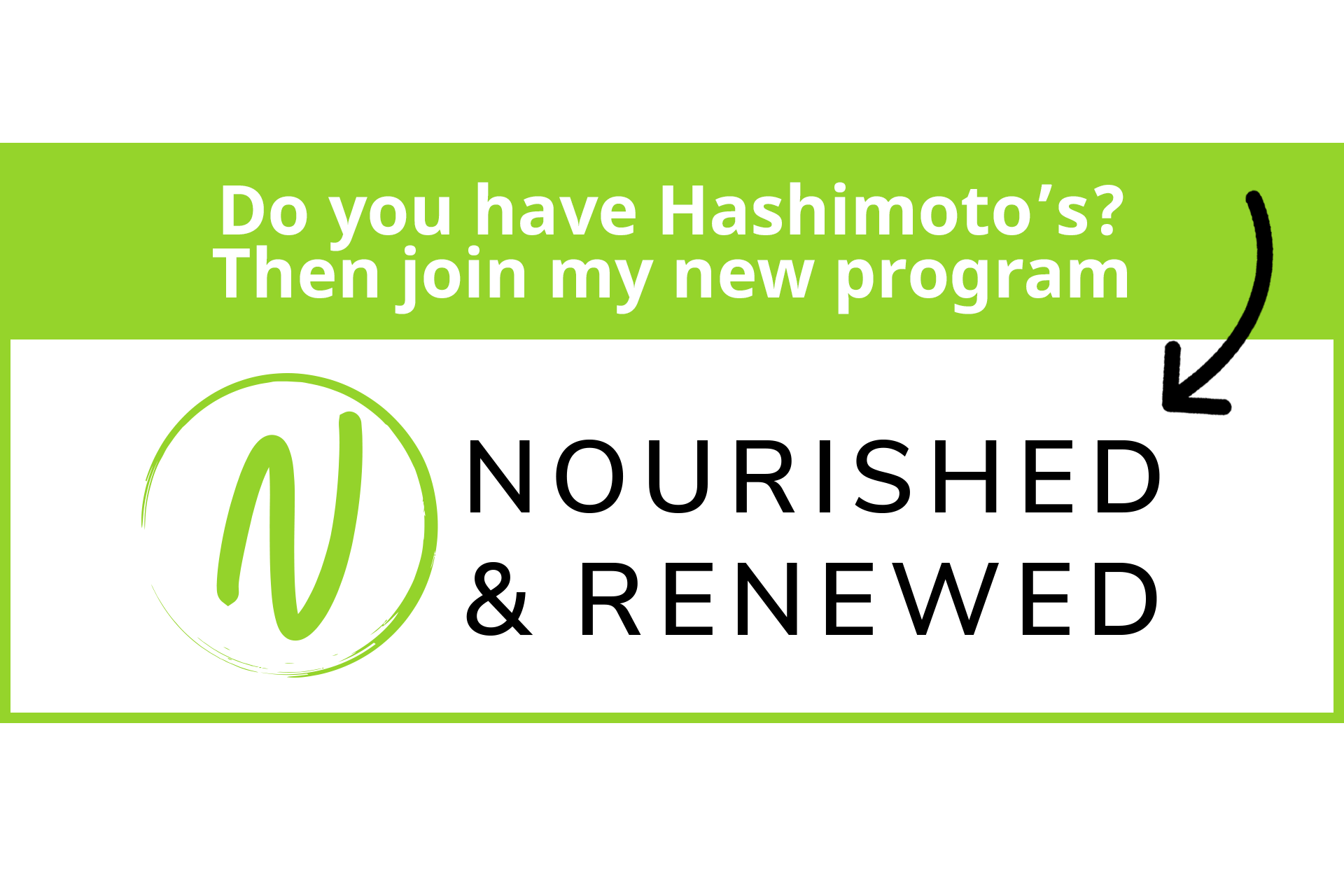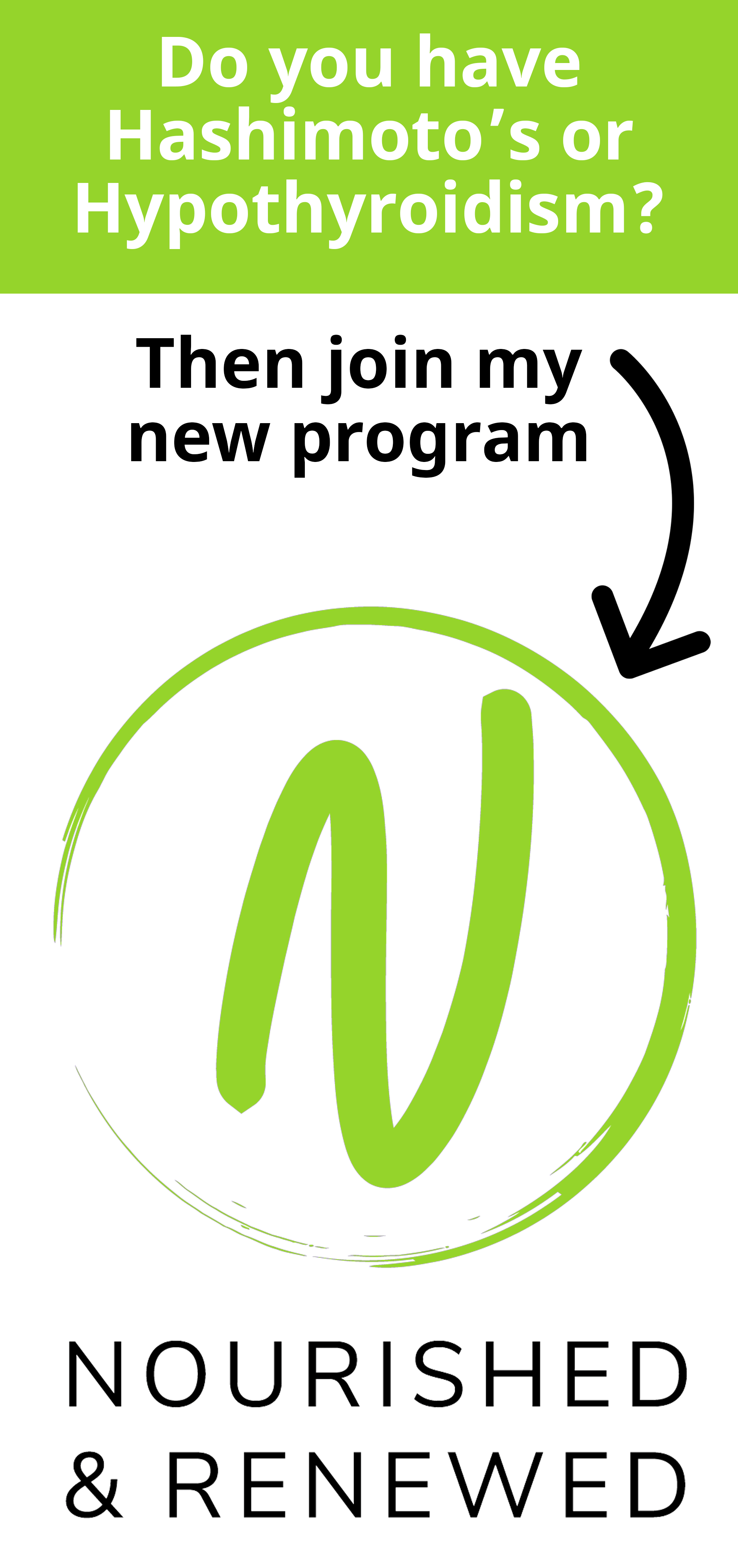Have you ever been lucky enough to try a Brazil nut?
I know, weird question. 😂
This very large and distinct-looking nut is often left behind in the bowl of mixed nuts because it looks different and maybe even weird.
In fact, Brazil nuts have a wonderfully creamy flavor and a texture that is often compared to coconut.
Almost as important, Brazil nuts are a great source of fiber and protein. But there’s a mineral that is going to make Brazil nuts your new best friend and a great excuse to put down the peanut and give them a try.
Brazil nuts are one of the richest sources of selenium of any food… almost to a fault. (But I’ll get to that later.)
And if you don’t know how important selenium is for your Hashimoto’s disease and overall thyroid health, you’re about to get a whole lot more knowledgeable about this nutty little mineral.

Selenium for your Health
Like many minerals, selenium isn’t needed in large quantities but it is still very much essential.
Selenium is most often noted for its antioxidant action. This means that it protects from the damage free radicals can have through oxidative stress.
Selenium helps activate enzymes that are critical for detoxification, called glutathione oxidases. Of the eight kinds of glutathione oxidases, five are known to require selenium, making the mineral a detoxing powerhouse, albeit indirectly.
There are indications that selenium-containing enzymes also help the body recycle vitamin C, adding to its antioxidant fame. This is especially important because, unlike most other mammals, humans are not able to make our own vitamin C.
Between acting as an antioxidant and boosting detoxification, it’s no wonder that people are looking to selenium for its abilities to fight cancer and prevent heart disease.
What does this have to do with the thyroid gland? Well, very little actually, except of course that decreasing oxidative stress and supporting detoxification can certainly help thyroid function.
But selenium’s more direct impact on Hashimoto’s and hypothyroidism has even more up its sleeve.

Hashimoto’s, Hypothyroidism and Selenium
Now we’re getting to the juicy stuff.
If you’ve read any of my blogs about Hashimoto’s or followed me on social media, you’ll know already that Hashimoto’s is an autoimmune disease that is the most common cause of hypothyroidism.
Hypothyroidism is when the thyroid gland does not create enough thyroid hormones, T4 and its active form, T3.
This can lead to sensitivity to cold, weight gain, hair thinning or loss, fatigue, infertility, depression and much more.
This is because the thyroid hormones help regulate our metabolism, which is involved in a number of body functions including heat regulation and energy use.
That conversion of thyroid hormones into the active form is where selenium comes in.
There is a group of enzymes called Iodothyronine deiodinases that, just like glutathione peroxidases, need selenium to function. Without these enzymes, the T4 hormone cannot be converted to T3.
Selenium and iodine, another mineral that is of utmost importance is thyroid health, work together to keep the thyroid functioning adequately.
Add to that the fact that the thyroid contains more selenium than any other tissue in the human body and I’m pretty I’ve got you on the selenium train.
Not Enough Selenium, Too Much Selenium
As with many minerals, like its pal iodine, selenium must be kept in balance. Not enough affects thyroid function; too much can even be fatal.
The good news is that selenium deficiency is rare in developed countries. The bad news is that declining soil quality may eventually decrease our natural exposure to selenium in our foods. At this point, we don’t have much to fear but it’s too early to know about future generations.
These days, selenium deficiency is usually caused by other factors, such as impaired digestion and absorption (increased risk in the elderly), HIV-positive status, Crohns’ disease and recent gastrointestinal bypass surgery.

Symptoms of selenium deficiency include:
- Infertility
- Hair loss
- Fatigue
- Weight gain
- Impacted immune system
- Difficulty focusing
If these sound familiar, you’ll recognize many of these as symptoms of hypothyroidism too. Hmmm.
The recommended amount of daily selenium is 55 mcg, but goes up to 60 mcg if you are pregnant and 70 mcg if nursing.
On the other end of the spectrum, it is not advised to digest more than 400 mcg of selenium per day.
If you are getting your selenium from food sources, as opposed to from supplements, you are most likely not in danger of toxicity.
However, the symptoms of toxicity include:
- Breath smells like garlic
- Metallic taste in the mouth
- Hair loss
- Brittle nails
- Nausea
- Skin rashes or lesions
- Diarrhea
- Fatigue
- Irritability
The most common food source of an overabundance of selenium is from our good old friend, the Brazil nut.
As much as they are a wonderful (and very tasty) source of selenium, depending on the soil where they are grown, Brazil nuts can contain so much of the mineral (68-91 mcg), that it is not advised to eat more than two per day.

Other food sources of selenium include:
Tuna, sardines, salmon and cod
Shrimp
Mushrooms (especially crimini and shiitake)
Asparagus
Mustard seeds
Chicken, turkey and lamb
One thing to consider is that while selenium is not affected by the storage of food, the cooking of meats and processing of grains (like brown rice, which contains some selenium) can cause the loss of some of the mineral.
When and How to Supplement with Selenium for Hashimoto’s
Keeping in mind that you need to walk that fine line of deficiency and toxicity of selenium, it can be hard to know whether you should supplement. Ideally you would get most or all of your selenium from food.
My approach is to only supplement if there are indications that it is necessary or you have had your nutrient levels tested and they indicate you are low. Then proceed slowly, starting with a low dosage and building up if needed. Keep your eyes peeled for signs of toxicity and always talk to your primary care provider when you add new supplements to your protocol.
Supplemented selenium comes in a few different forms. The main difference is how well they are absorbed.
The most easy to find and cheapest form is selenium citrate. But it is not as well absorbed as some other (sometimes more expensive) forms, such as L-selenomethionine and selenocysteine.
A good and safe dosage for supplementation is 200 mcg per day, taken with food since that is how you would naturally get your selenium and to allow it to work together with other nutrients.
Supplemented selenium is sometimes found partnered with vitamin E, because they both boost antioxidant action and work together against free radicals.
There has been recent concern and research into the possibility that vitamin E and selenium, taken together and separately, may increase the risk of prostate cancer. I would therefore not advise taking either if you are already at higher risk for prostate cancer.
Although there are no medication interaction concerns with selenium, it is not advised to take it while also taking any forms of blood thinners or anticoagulants, as it may slow blood clotting.
Fortunately, selenium is safe to take while on any thyroid medications, as there are no known interactions.

Think About the Big Picture For Your Thyroid
Look, selenium is an amazing nutrient for supporting a healthy life with Hashimoto’s but it’s not a miracle mineral. It’s a great and crucial piece of the puzzle.
Because of its role in converting the T4 thyroid hormone into the active T3 form, selenium-containing foods should be a part of your regular diet. And if there are indications of a selenium deficiency, supplementation may also be necessary.
But selenium alone is not the answer. You still need the benefits of other thyroid-supporting nutrients like iodine, vitamin D, magnesium, and zinc. And just as important can be finding the right thyroid medication, getting exercise, managing stress and balancing your blood sugar.
And if you see the benefits of having selenium be a part of your thyroid health plan, don’t be scared to grab the occasional Brazil nut.
If you’re ready to go beyond these simple yet effective steps to restore your thyroid health and manage your Hashimoto’s, my 30-day Nourished and Renewed with Hashimoto’s Program provides the necessary tools and resources all in one place for you to set off on your healing journey.
Another great option for those needing more personalized care, check out my Happy & Healthy Adult program, perfect if you’re struggling with more complex health issues related to Hashimoto’s or another disorder.



